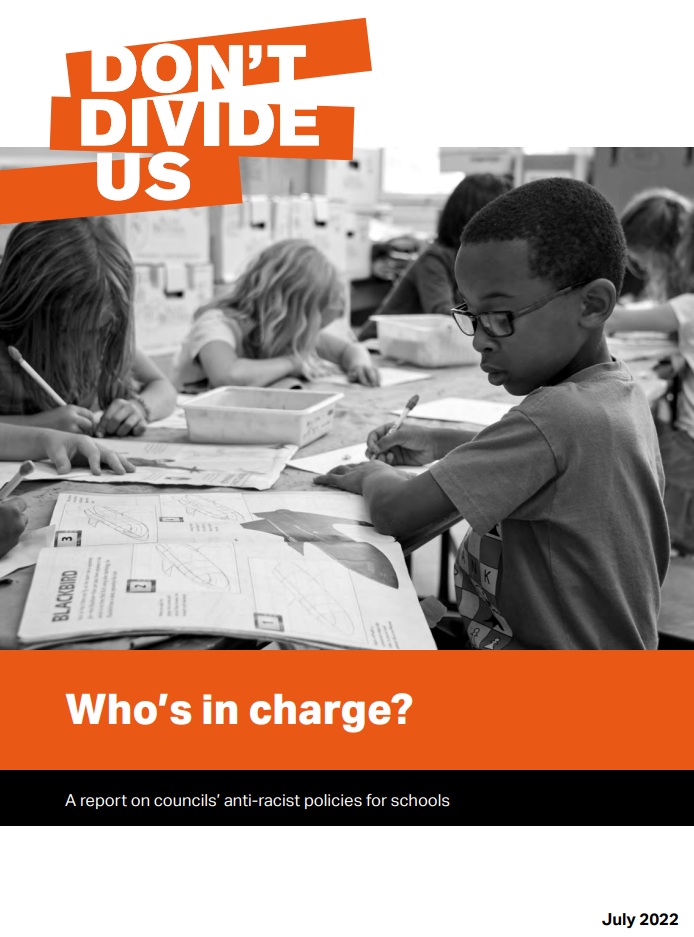Who’s in Charge?
A report on councils’ anti-racist policies for schools
Executive summary
In 2021 we were alerted by concerned parents and teachers to a divisive and partisan teacher professional development course, Racial Literacy 101, being sponsored by Brighton and Hove Council. Our whistleblowers revealed contentious advice to teachers, with the council recommending lesson plans that focused on racial division being taught to children as young as five. Following widespread concern in Parliament, the Education Secretary, Rt. Hon Nadim Zahawi MP, launched an enquiry and we await its publication.
In light of that experience, alongside curriculum examples we have received from parents and teachers elsewhere over the past two years, we set out to develop a granular picture of how Equality, Diversity and Inclusion (“EDI”) and anti-racist policies are being implemented by local councils across England and Wales. Alongside this, we sought the views of parents to test whether public thinking was aligned to the strategic direction being promoted by local councils. What we found is deeply concerning and demonstrates a widening gulf between parents and those tasked with the education of their children.
Almost one in four councils (23%) that are transparent about their policies are promoting a deeply biased and highly contentious model of anti-racism, based on division, in their education policies and guidance (for the purposes of this report, we refer to these as “Biased councils”). This approach suppresses the distinction between facts, opinions, and beliefs. Key concepts such as ‘structural racism’, ‘white privilege’ and ‘unconscious bias’ – ill-defined concepts that enable varying interpretations and policies – are present throughout.
Of these biased councils, the vast majority (88%) partner with third party providers (“3PPs”), nominally commercial companies and charities. This is a growing field, with over half of councils now partnering with third party providers overall. Councils are not transparent about these partnerships, despite many providers adopting an activist orientation. DDU supporters are repeatedly denied access to teaching materials from these providers on grounds of commercial interest. It is striking that not a single Council we identified as adopting an unbiased position employs or partners with a third-party provider. The Government has rightly criticised the roles of third-party providers within Higher Education settings – namely Advance HE and Stonewall. Our findings indicate that primary settings have been severely overlooked.
This stands in opposition to the beliefs of parents. A YouGov poll, commissioned by Don’t Divide Us, demonstrates that a majority of parents (38%) believe schools should not teach pupils that Britain is structurally racist, such as concepts that Britain is structurally racist. More than two thirds (69%) believe schools should teach in a non-partisan way. Teaching a diversity of viewpoints in a way that encourages independent thinking and judgment – a publicly accepted educational goal – remains the view of parents and should not be denied. Tellingly, 71% of parents believe they have a fundamental right to access lessons plans and teaching materials.
Perhaps the most troubling finding is the complete lack of transparency at Local Council level. Just over half of councils (54.3%) approached either did not respond to Freedom of Information requests or failed to provide sufficient information about their EDI policies or their use of third-party providers.
There is little standardisation in how councils interpret concepts of ‘racism’, ‘anti-racism’, ‘diversity’, ‘inclusion’ and ‘equality’. There is no uniform understanding of the role schools should play in combatting racism, making schools vulnerable to indoctrination by biased councils, going well beyond existing legislation and accepted norms. In effect, we have found a postcode lottery, where children from Birmingham, Brighton, Cardiff, London, Nottingham and elsewhere are more likely to be taught vastly differently on issues of race than children from Barnsley, Blackpool, Durham, Hertfordshire and Kent.
We conclude that that the model of anti-racism – which asserts that Britain is a systematically racist society which automatically discriminates against racial minorities and denies the progress we have made in becoming a successful multi-cultural society – is being legitimised in schools through the reframing of equality policies. This is having a detrimental impact on educational aims, with little or no scrutiny from any independent authority, and risks eroding trust between parents and schools. If not confronted, we are in danger of creating a generation of division and distrust in the very institutions tasked with shaping our children’s futures.
Read the full report here.


